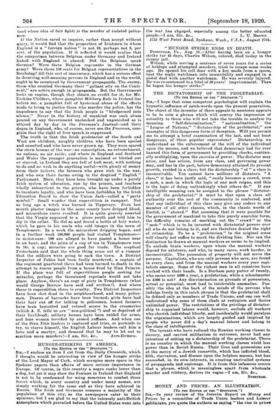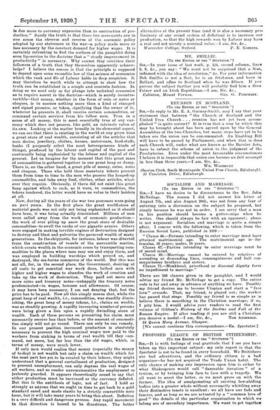MONEY AND PRICES: AN ILLUSTRATION. [To THE EDITOR OF THE
" SPECTATOR."] SIR,—In your review of the Interim Report on Money and Prices by a committee of Trade Union leaders and Labour politicians, you quote the authors as shying " the rise in prices is due more to currency expansion than to contraction of pro- duction." Surely the truth is that these two movements are in one sense the obverse and reverse of the economic policy adopted by our statesmen in the war—e. policy made more or less necessary by the constant demand for higher wages. It is certainly refreshing to find the authors of the pamphlet doing even lip-service to the doctrine that a " steady improvement in productivity " is necessary. Why cannot they convince their followers of a truth that they themselves apparently acknow- ledge? I believe the reason is that the principle is supposed to depend upon some recondite law of that science of economics which the rank and file of Labour holds in deep suspicion. It may therefore be worth while to attempt to show how the truth can be established in a simple and concrete fashion. In doing so we need only so far plunge into technical economics as to require assent to the doctrine—which is surely incontro- vertible—that money, whether in the form of coin or notes or cheques, is in essence nothing more than a kind of stamped and signed promise, or token, signifying that the owner of it, whenever he presents it, shall receive certain commodities, or command certain services from his fellow men. True in a sense of all money, this is most essentially true of any cur- rency which does not possess, like gold, an intrinsic value of its own. Looking at the matter broadly in its elemental aspect, we can see that there is existing in the world at any given time a great store of real wealth, consisting of all the articles that men desire, jewellery, clothes, houses, motor-cars, food-stuffs, books (I purposely select the most heterogeneous kinds of things), produced by the labour and capital of the past and continually being replenished by the labour and capital of the present. Let us imagine for the moment that this great mass of commodities is gathered together in one great heap or dump. There is, on the other hand, a great pile of money, coins, notes and cheques. Those who hold these monetary tokens present them from time to time to the men who possess the heaped-up commodities, and take away food, clothes, other articles, what- ever they require. Obviously, if there did not exist this great heap against which to cash, as it were, in commodities, the tokens tendered, the latter would have no value to their holders at all.
Now, during all the years of the war two processes were going on pari passu. In the first place the great world-store of material goods was not only _not being replenished as it should have been, it was being actually diminished. Millions of men were called away from the work of economic production— the work of ever piling up anew the great store of desirable commodities—to swell the ranks of our gigantic armies. Others were engaged in making terrible engines of destruction designed to destroy and blast and pulverize the garnered wealth of many generations. In the shipyards, for instance, labour was diverted from the construction of vessels of the mercantile marine, which create wealth in the economic sense by transporting com- modities to the places where men may use and enjoy them, and was employed in building warships which preyed on, and destroyed, the sea-borne commerce of the world. But this was not all, for, in the second place, the Government, desiring at all costs to get essential war work done, bribed men with higher and higher wages to abandon the work of creation and take up the work of destruction. They paid out more and more coins and treasury notes—unhappily the treasury notes predominated—in wages, bonuses and allowances. Of course, it may have been necessary, I am not denying that, but the price has to be paid. Now all this simply means that, while the great heap of real wealth, i.e., commodities, was steadily dimin- ishing, the great heap of money tokens, i.e., claims on wealth, was as steadily growing. A rapidly increasing numberof persons were being given a lien upon a rapidly dwindling store of wealth. Each of these persons on presenting his claim must necessarily receive less than before, or the amount of commodi- ties simply will not go round. There can only be one remedy. In our present position increased production is absolutely necessary to prevent the high nominal wages now paid to the workers from sinking in terms of real wealth till they tom- /nand, not more, but far less than the old wages, which, in terms of money, were much lower.
If only men would realize that money (especially the money of to-day) is not wealth but only a claim on wealth which for the most part has yet to be created by their, labour, they might understand that a general curtailment of production, designed to prevent unemployment, can only depress the real wages of all workers, and so render unremunerative the employment so jealously guarded. It appears theoretically sound to say that either production must he increased or the currency deflated.
But this is the antithesis of logic, not of fact. I hold as strongly as anyone that we ought in time to get back to a gold standard eased and made elastic by a strictly convertible note issue, but it will take many years to bring this about. Deflation is a very difficult and dangerous process. Any rapid movement in that direction is bound to be disastrous. The better alternative at the present time (and it is also a necessary pre- liminary of any sound system of deflation) is to increase our production, so that the high rewards won by Labour may have a real and not merely a nominal value.—I am, Sir, &c.,







































 Previous page
Previous page